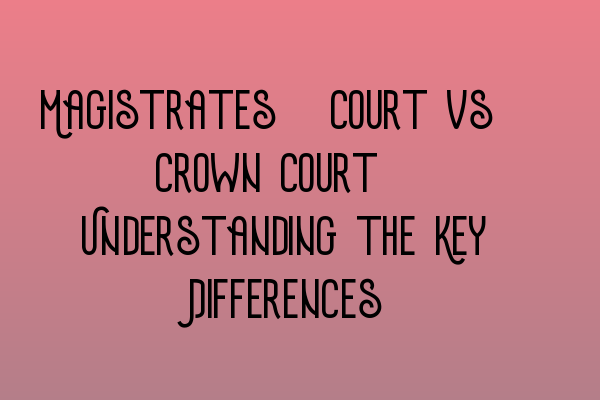Magistrates’ Court vs. Crown Court: Understanding the Key Differences
When it comes to legal proceedings in the UK, the Magistrates’ Court and the Crown Court play critical roles in the justice system. Understanding the key differences between these two courts is essential for both legal professionals and the general public. In this article, we will explore the distinctions between the Magistrates’ Court and the Crown Court, shedding light on their purposes, jurisdiction, and procedures.
Overview of the Magistrates’ Court
The Magistrates’ Court is the first point of contact for most criminal cases in the UK. It handles the majority of hearings and trials, dealing with less serious offenses such as minor theft, public disorder, and traffic violations. Magistrates’ Courts are presided over by a bench of magistrates, who are trained volunteers from the local community and a legal advisor. The court operates on a summary basis, which means that it deals with cases quickly and without a jury.
In the Magistrates’ Court, the emphasis is primarily on speedy justice and efficiency, ensuring that minor offenses are dealt with promptly. This approach helps to alleviate the burden on the Crown Court, allowing it to focus on more serious and complex cases.
Although the Magistrates’ Court deals with less serious offenses, it can still impose significant penalties, including fines, community orders, and short prison sentences. In cases where the offense warrants a more severe punishment, the Magistrates’ Court has the power to send the case to the Crown Court for trial.
Understanding the Crown Court
The Crown Court is a higher court that handles more serious criminal cases. It has the authority to hear both indictable offenses and cases sent from the Magistrates’ Court for trial. The Crown Court is presided over by a judge, whose role is to ensure fair proceedings and apply the appropriate legal principles.
Unlike the Magistrates’ Court, the Crown Court has the power to impose longer prison sentences, including life imprisonment for the most serious offenses. Additionally, the Crown Court conducts trials with a jury, typically composed of twelve members of the public who are selected randomly from the electoral register.
One significant difference between the two courts is the nature of the trials. In the Magistrates’ Court, trials are conducted by the bench of magistrates, without a jury. On the other hand, in the Crown Court, the judge instructs the jury on the law, and the jury decides on the guilt or innocence of the defendant based on the evidence presented during the trial.
Jurisdiction and Appeal Processes
Understanding the jurisdiction and the appeal processes of the Magistrates’ Court and the Crown Court is vital for anyone involved in the legal system. The Magistrates’ Court has limited jurisdiction, primarily dealing with summary offenses and sending more serious cases to the Crown Court.
In terms of appeals, decisions made in the Magistrates’ Court can be appealed to the Crown Court, and further appeals can be made to the Court of Appeal and, in some cases, to the Supreme Court. The Crown Court, on the other hand, handles appeals from the lower courts, as well as cases sent for retrial.
Conclusion
The Magistrates’ Court and the Crown Court serve different purposes within the UK justice system. While the Magistrates’ Court deals with less serious offenses and aims for speedy justice, the Crown Court handles more serious cases with longer-term implications. Understanding these key differences is crucial for legal professionals and those seeking justice.
To learn more about the SQE Criminal Law & Practice in the UK, check out these related articles:
